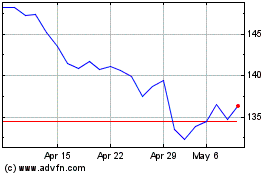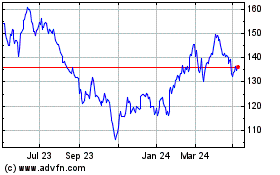Volkswagen to Test Quantum Navigation App in Real Traffic
October 31 2019 - 4:51PM
Dow Jones News
By Sara Castellanos
Volkswagen AG plans to test a quantum-computer-powered
navigation app in Lisbon next week, part of a larger plan to
include such a feature in its vehicles within the next few
years.
The Germany-based company, the world's biggest auto maker by
sales, has been working to commercialize this technology for about
three years.
The Lisbon test is timed to coincide with the city's Web Summit
technology conference. Nine public buses ferrying riders between
the conference and other parts of the city will be equipped with
iPads loaded with the "quantum routing" application, which includes
technology from British Columbia-based D-Wave Systems Inc.
The app uses cloud-based quantum-computing services to calculate
the fastest route for each of those nine buses in near real-time.
The goal is to help prevent traffic jams and cut down travel time,
said Martin Hofmann, Volkswagen's chief information officer.
The Volkswagen app is different from traditional driving
navigation apps, which show vehicles which routes are less
congested, giving the same information to all vehicles in a given
area. The VW app spells out an individualized route for each
participating bus.
"We'll change the way traffic moves, which is a milestone for
us," said Dr. Hofmann, who oversees information technology for
Volkswagen's 12 brands, including Audi, Porsche and Bentley.
Volkswagen expects to roll out the quantum-routing feature in
mid-2020 to public-transportation partners in a high-density city,
perhaps in Lisbon, Dr. Hofmann said.
Quantum computers are still years away from large-scale
commercial applications due to hardware challenges, experts say.
But experimentation continues. Researchers at Alphabet Inc.'s
Google last week announced they built a machine capable of
generating about 1 million random strings of numbers in roughly
three minutes, a task that they said would have taken the world's
fastest conventional supercomputer 10,000 years.
Whether such power is truly needed for routing traffic is up for
debate, said Dan Garrison, master technology architect at Accenture
PLC's quantum consulting practice. Volkswagen's pilot project shows
that companies are getting better at understanding what can be done
with a quantum computer, he said.
Vern Brownell, chief executive of D-Wave Systems, said a
quantum-routing application has the potential to solve business
problems, including far more complex traffic-optimization problems
that are beyond the scope of today's supercomputers.
An earlier collaboration between Volkswagen and D-Wave involved
a simulation three years ago that created specific routes for
10,000 taxis traveling between downtown Beijing and the nearest
airport, about 20 miles away, in the fastest time possible without
creating a traffic jam.
The Lisbon test, although happening on real streets, will be on
a far smaller scale.
Buses in the Lisbon pilot will cover 26 stops, transporting
thousands of riders in four directions from the conference center.
One bus line, for example, will cover several stations between the
conference center and Marquês de Pombal.
A predictive-analytics tool running on a classical computer will
identify 45 minutes ahead of time which of the 26 stops is expected
to have especially high passenger numbers. To solve that
calculation, the German auto maker uses anonymized data from
cellphone users that includes GPS positions, date, time and
movement.
The quantum computer will calculate in milliseconds the fastest
route for each individual bus, taking into account millions of
real-time data points about traffic congestion and ridership
demand. Each bus will be assigned an individual route every two
minutes so they don't slow down traffic.
The same calculation would take dozens of minutes on a classical
computer, Dr. Hofmann said.
"What's exciting about this work is that it's being applied in
the real world," said Scott Pakin, a computer scientist at Los
Alamos National Laboratory.
Other auto makers including Ford Motor Co. are experimenting
with how quantum computing could quickly optimize driving routes
and improve the structure of batteries for electric vehicles.
By 2023, 20% of organizations, including businesses and
governments, are expected to budget for quantum-computing projects,
up from less than 1% in 2018, according to technology research and
advisory firm Gartner Inc.
Write to Sara Castellanos at sara.castellanos@wsj.com
(END) Dow Jones Newswires
October 31, 2019 16:36 ET (20:36 GMT)
Copyright (c) 2019 Dow Jones & Company, Inc.
Volkswagen (TG:VOW)
Historical Stock Chart
From Mar 2024 to Apr 2024

Volkswagen (TG:VOW)
Historical Stock Chart
From Apr 2023 to Apr 2024
